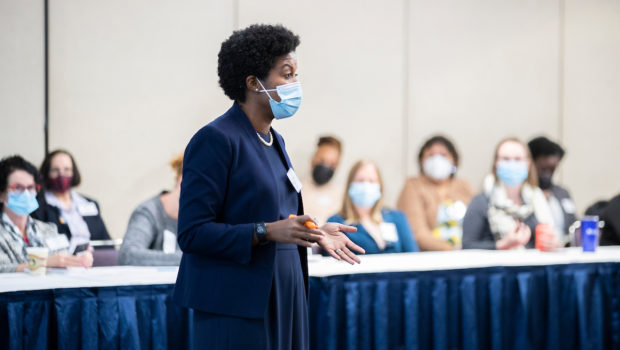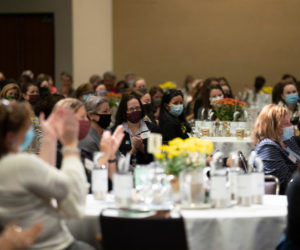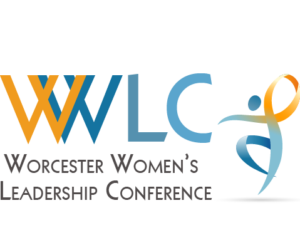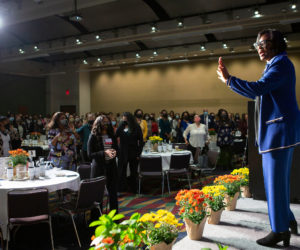COVID-19 and the country’s heightened consciousness of racial inequities have created difficult work environments. Two Worcester Women’s Leadership Conference workshops held Oct. 28 offered practical advice to women leaders navigating uncharted workplace challenges.
At times, the leadership stresses seemed never-ending in the UMass Memorial Health system. In a panel presentation, “Leading through Lemons: How to Support and Inspire When the Going Gets Tough,” five female department chairs at UMass Memorial Medical Group reflected on their experiences during those first weeks of the pandemic and how they manage their staff and themselves differently because of it.
One speaker started as department head a month before the first wave, another had to lead with her writing arm in a sling, a third was hired mid-pandemic. All five addressed the uncertainty and fear – their own and their staff’s – when little was known about the virus and patient death rates were higher than few had ever encountered.
“I remember the day it became a reality for me,” said OB/GYN Department Chair Tiffany Moore Simas, MD, MPH, Med, FACOG. Faculty members reported that many women late in their pregnancies in New York suddenly wanted to transfer their care to Massachusetts. “I became very aware that … the scope of the decisions we were making had ripple effects,” she said. Her position as department leader morphed overnight to community and regional leader.
More communication, more meetings were the panelists’ constant refrain. Nightly emails became a form of journaling for Moore Simas. Frequent town halls open to the entire community were hallmarks for M. Diane McKee, MD, MS, as she led the Department of Family Medicine & Community Health.
“These were important for me to convey information that was rapidly changing,” said Dr. McKee. “But it was almost as important for me to hear what was bothering people.”
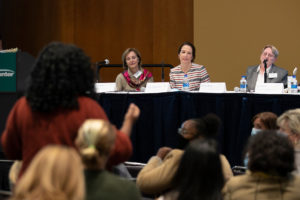
A panel of female doctors —who are all department chairs at UMass Memorial Medical Group—field a question from the audience during their morning workshop session. Photo by Matt Wright.
Several leaders felt strongly they needed to be physically present and available for staff. Founding Dermatology Chair Mary Maloney, MD, knew that her rotator cuff surgery recovery didn’t affect her ears or her mouth. Her visibility gave people a sense of security, she said, seeing “someone was still leading the department and making the decisions that needed to be made.” Others took hospital shifts wherever needed.
Connecting with her team on a personal level was essential for Department of Ophthalmology Chair Shlomit Schaal, MD, PhD, MHCM. Weekend calls to each staffer had her asking how they were doing, then giving them “the space and psychological safety to answer truthfully.” Panelists also recommended frequent signs of appreciation, posting thank-you notes written by community members, and bringing in special treats, recognizing the demands their jobs placed on their families as well.
Audience questions led to discussions of self-care for leaders under so much pressure. “We had to be very, very intentional,” said Psychiatry Chair Kimberly Yonkers, MD. Walks in nature, swimming, mandolin playing, and reading novels were among the activities that gave them the energy and strength to lead and guide others.
An afternoon interactive session with two Blue Cross Blue Shield of Massachusetts diversity, equity, and inclusion leaders, “DE&I: Creating and Sustaining Workspaces that Promote Inclusion and Wellness,” had participants sharing their current roles before learning new approaches to difficult workplace communication, whether remote or in-person.
Presenters Maria Fernandes-Dominique and Nicole Ferraro combined technical tools and wellness interventions as resources to facilitate conversations. Ms. Fernandes-Dominique reviewed ever-changing definitions of inclusion and belonging — creating a welcoming space and once there, feeling recognized and respected.
Ms. Ferraro practiced breathing and body work to help focus facilitators’ energy.
Before a meeting, Ms. Fernandes-Dominique asked attendees to examine their role, who to partner with, and how they can be a safe “container” for the emotions likely to emerge, and what outcomes they want. Establish group agreements for honesty and confidentiality.
Using the “5 Cs continuum,” she walked through alternative responses to unwelcome behavior, such as encountering past racist social media messages. In today’s culture, many “call out” or “cancel” the offending author, making public demands for behavior changes coupled with punitive consequences, such as job loss.
Consider “call in” instead, she said, using active listening skills for difficult dialogues with others while respecting their differences. Without those skills, simply “call on” them, asking they consider their actions, but not offering them a way to learn how to change. Or “call it off,” disengaging from the conversation, she said.
Attendees at both workshops gained new leadership tools for unanticipated conditions.
Note: UMass Memorial Health was a presenting sponsor of the 2021 conference; Blue Cross Blue Shield of Massachusetts was a keynote sponsor.
Allison Chisolm is a correspondent and the Founder & Principal of Chamber member business Choice Words/Chisolm & Co. To contact the Chamber’s editorial staff, please contact Director of Communications Dominique Goyette-Connerty.
This story was originally published in the November 2021 edition of Chamber Exchange: The Newspaper, a quarterly publication of the Chamber. All newspaper editions are archived here.
The WWLC workshop committee is currently seeking expert speakers and panelists to host workshops at the 2022 conference. Proposals are due February 1, 2022. For more information, click here.



